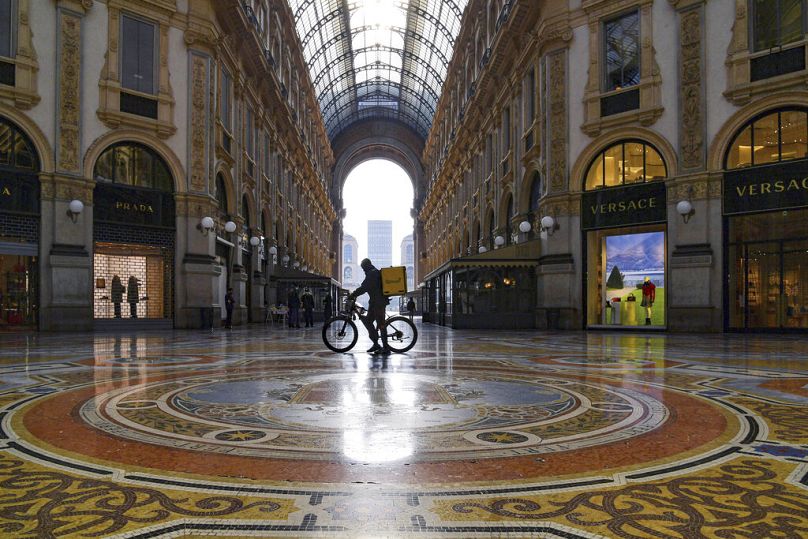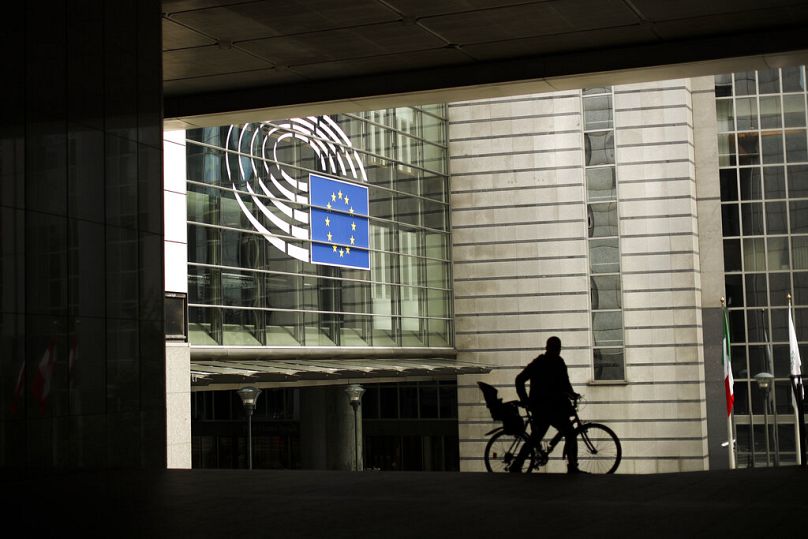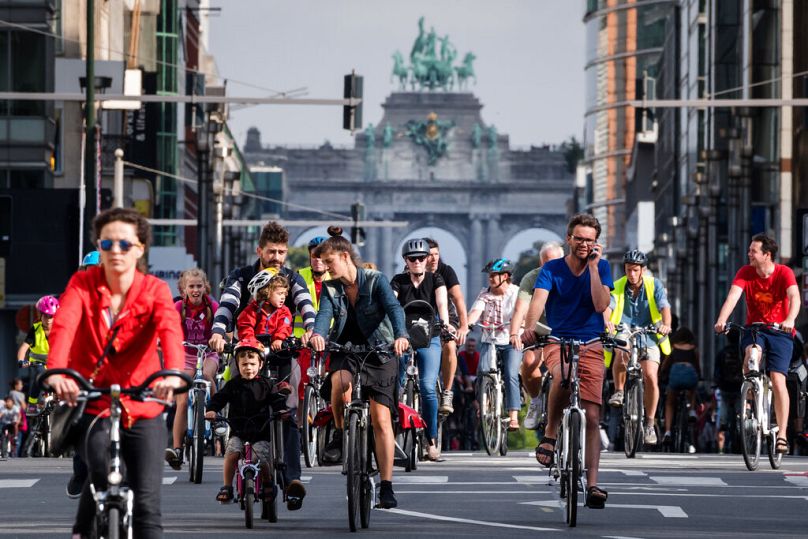My colleagues and I are convinced that cycling is the future. We need the EU and its member states to step to the challenge and recognise cycling as a phenomenal tool with immense transformative power, Line Barfod writes.
Last year, Copenhagen and Denmark hosted the Tour de France Grand Départ, the start of the course of the coveted cycling competition.
 ADVERTISEMENT
ADVERTISEMENT
 ADVERTISEMENT
ADVERTISEMENT
It was a great celebration of both sports cycling and the decadelong everyday cycling culture of Copenhagen and Denmark.
The Danish capital is showing what we can achieve once we tap into the power of cycling.
Every morning in Copenhagen, while cars are stuck in traffic, thousands of cyclists zoom through the city on their way to work and school via bicycle tracks, cycling streets, cycling superhighways, shortcuts and cycling bridges.
With the emergence of e-bikes and cargo bikes, we are convinced that cycling uptake will continue to rise in the years to come.
A veritable cargo bike revolution is also taking place in Copenhagen: in less than three years, cargo bikes increased from 20,000 in 2020 to more than 40,000 in 2023.
Parents use cargo bikes to transport children; delivery companies employ them to move food and parcels around town; and a growing number of construction companies are using them to transport tools and materials.
In Copenhagen, a roadside assistance company even reaches clients on a cargo bike when their cars break down.
A large increase in love for bicycles elsewhere in Europe
Since 2020, cycling uptake has seen a large increase across the continent. During the coronavirus pandemic, cycling offered a safe, efficient, and healthy transportation solution across the continent, alleviating pressure on public transport and providing commuters with safe distancing.
However, despite cycling’s renewed popularity and enormous potential, only 7.4% of the total number of trips are made by bike in the EU-27 on average.
This low share is paradoxical as cycling is a formidable ally in the fight against pollution and in the journey towards more liveable cities.
No wonder, then, that much anticipation is building ahead of the upcoming Cycling Declaration of the European Commission. Slated for October, the document is expected to set rules, guidance and funding instruments to double the number of cycled kilometres by 2030.
The declaration will finally recognise cycling as an essential element of our shared European transport system and bolster cities’ long-standing efforts.
Cycling strategy task force in the works
More and more local governments in Europe are prioritising cycling to move away from the car-centric mentality that in the second half of the 20th century transformed our cities into islands of pollution and noise.
With 75% of Europeans living in urban environments, cities have a crucial role to play and stand ready to support the EU’s cycling ambitions.
In recent months, Copenhagen and other cities of the Eurocities network joined forces to create a cycling strategy task force.
The goal is to offer recommendations that would inform the European Commission’s Cycling Declaration’s final text. We are convinced that our know-how on cycling can be of tremendous value to EU policymakers.
Our advice is also supported by a Eurocities Pulse survey of 29 municipalities to understand cities’ cycling challenges and expectations.
One of our top priorities is that the EU should adopt a wide-ranging, ambitious Cycling Declaration.
The document should pave the way for developing high-quality bike infrastructure, taking a bold approach, and setting common guidance on bike infrastructure and minimum quality levels throughout Europe.
Traffic rules across Europe throw a wrench in cycling
A lack of road safety stops many people from even considering cycling. Therefore, treating cyclists’ protection as a priority should also be front and centre of the new legislation.
Current national traffic laws in many EU countries hinder cycling, so the declaration is an opportunity to update national traffic rules and create cooperation between local and national authorities.
The European Commission should also initiate a reflection on the adequacy of national traffic rules for cycling and consider setting a 30km/h speed limit in urban areas.
Furthermore, standardising tools for collecting cycling data would help many cities make better-informed decisions on their own cycling policies.
At the same time, special attention should be focused on making cycling as accessible as possible to all urban residents, especially those who cannot afford to buy a bike or whose disability prevents them from using a standard two-wheeler.
Moreover, the lack of bike products and services should no longer stand in the way of the EU’s cycling industry. Greater cooperation mechanisms can create a strong cycling industry in Europe to prevent bike shortages.
Cycling is the future
Lastly, as EU policy moves to strengthen links between urban and rural areas, we advocate using cycling to improve those connections.
A large network of high-end cycling superhighways has made long-distance bicycle commuting a viable option for people in Greater Copenhagen, and similar projects are underway in many places around Europe.
To bolster this effort, cycling-friendly conditions should be set for travelling on public transport with a bike, cycling to and from the station or using their bikes in combination with other modes of transport.
My colleagues and I are convinced that cycling is the future. We need the EU and its member states to step to the challenge and recognise cycling as a phenomenal tool with immense transformative power.
It’s hard to overstate how much cycling can do to improve our public health, air quality, public spaces and living standards.
Cities are leading the way toward a cycling revolution; will the EU follow suit?
Line Barfod is the Mayor for Technical & Environmental Affairs in the Danish capital Copenhagen.
At Euronews, we believe all views matter. Contact us at view@euronews.com to send pitches or submissions and be part of the conversation.













